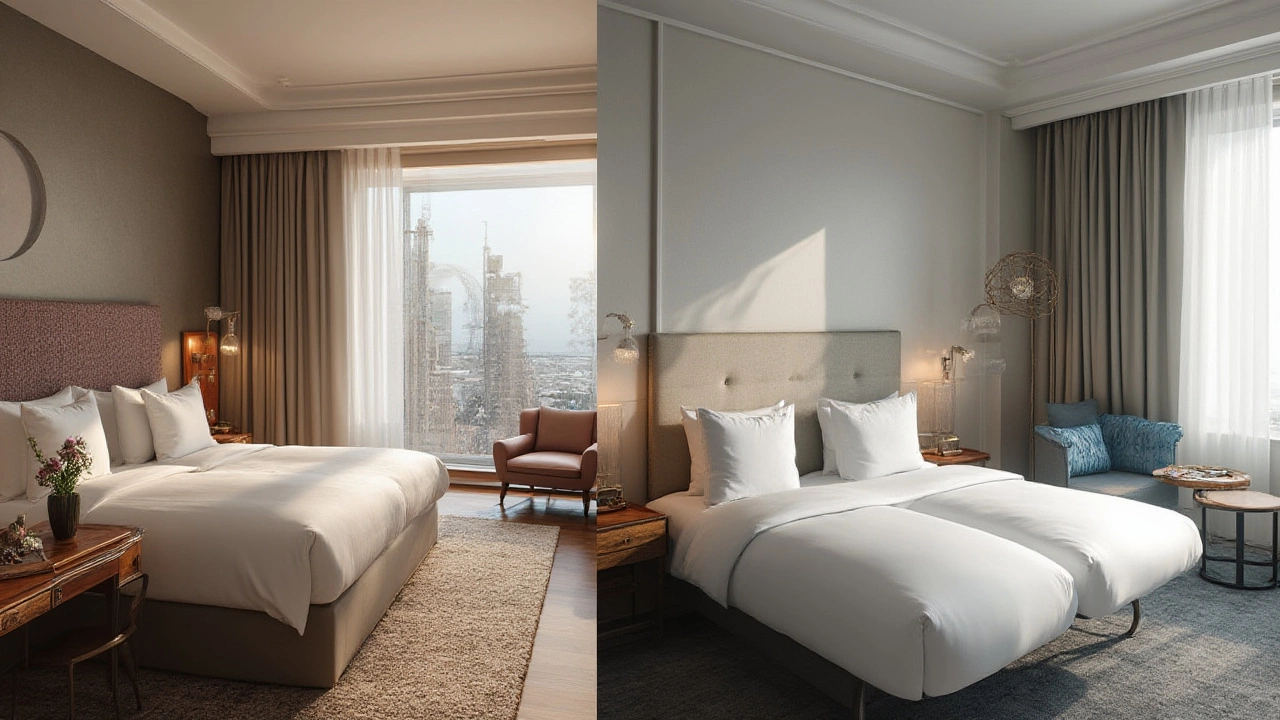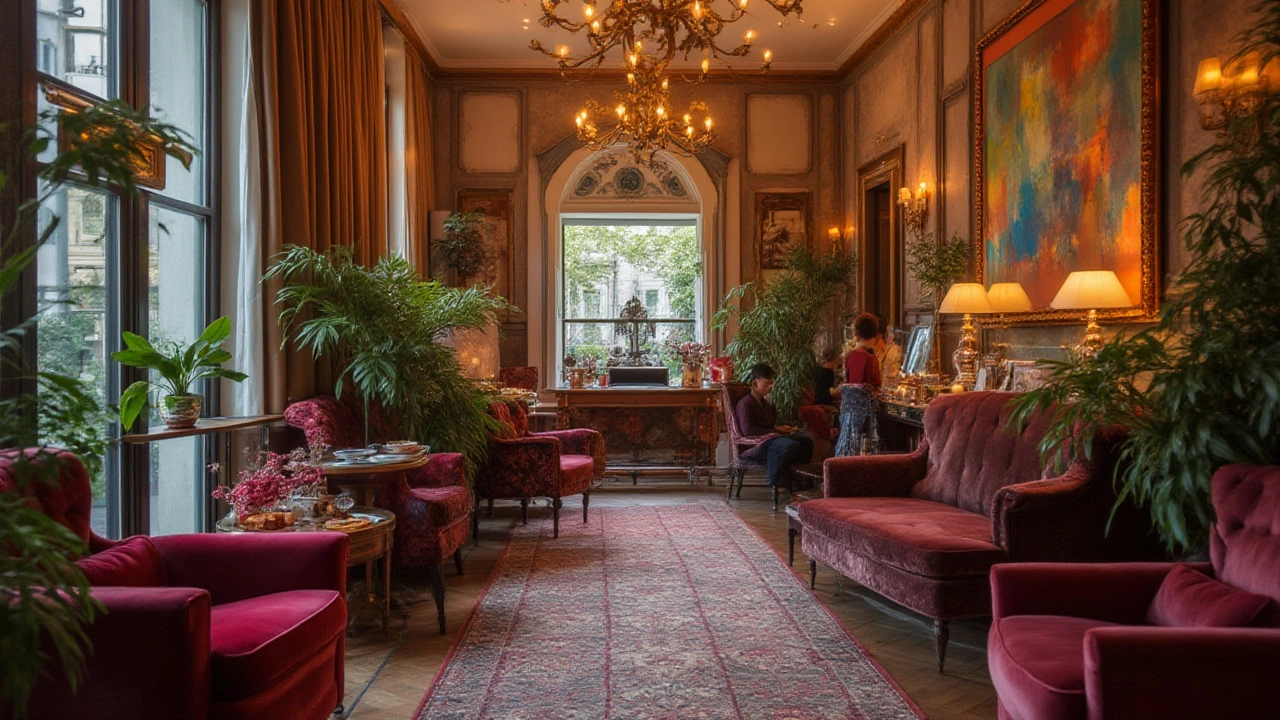You might think a hotel is just a hotel. Book, check in, sleep, repeat. But step into a boutique hotel, and it quickly hits you—this is not your usual chain experience. People who’ve only stayed in big brands like Hilton or Holiday Inn are often hit by a wave of surprise: the art hanging in the lobby feels like it belongs in a gallery, the scent in the corridors is oddly fancy, and yes, the person at reception actually remembers your name without glancing at a screen. The world of boutique hotels is a rabbit hole of character, and if you know what you’re looking for, you can make your trip way more interesting, whether you’re traveling for something special or just want the basics done really well.
The Look and Feel: Size, Style, and Ambience
First things first, boutique hotels usually spell small. We're talking less than 100 rooms—often closer to 20 or 50. But don’t let that number fool you. These places are experts at making every square meter count. Walk into a boutique hotel in Paris or Barcelona, and chances are you’ll spot local artists' work, quirky wallpaper, or an antique chair that looks like it wandered in from a movie set. It’s not the cookie-cutter vibe you find in chain hotels where the rooms can feel identical whether you’re in Dublin or Dubai.
The décor is where boutique hotels love to flex. Take The Dean in Dublin—retro music posters in the elevator, neon signs over beds, custom tiles in every bathroom. Boutique means someone cared enough to design the place for people, not just for profits. Regular hotels tend to stick to safe, neutral tones, mass-produced furniture, and what insiders call “brand standards.” That’s handy if you want everything familiar and predictable, but it can feel a bit dull if you crave atmosphere.
The ambience in a boutique hotel often feels like it’s an extension of the local neighborhood. You might find a cocktail bar in the lobby hosting a jazz night, or a tiny library with rare books. There’s a sort of buzz—a lived-in feeling. Many boutique hotels pride themselves on their scent marketing (yes, that’s a thing!) to make your stay memorable long after you check out. Big chain hotels rarely experiment with scent or sound; everything’s dialed to neutral, aiming to offend no one.
Service Quality: Personal Touches vs. Corporate Efficiency
This is where boutique hotels really stand out. Instead of process-driven service (think: rigid check-in times, standardized greetings), boutique staff often act more like hosts at a friend’s house. Don’t be surprised if the hotel manager remembers your name—or your dog’s name if they’re pet-friendly. If you mention you’re in town for your anniversary, you could walk in after dinner to find champagne on ice.
Regular hotels have nailed efficiency. If you want room service at 2am or a gym open 24/7, they’ve got you. But that comes from highly structured teams: concierge, front desk, housekeeping—and sometimes, you’ll need to call three different departments to get a late-night snack. Staff might be super polite, but the personal connection? Often missing, simply because the pace is high and the template is firmly in place.
Boutique hotels can give you flexibility—maybe they’ll let you check out late because your flight got delayed or help find tickets to that totally booked local gig. Try asking for that in a mega-chain during peak season and you’ll usually get a polite “Sorry, no.” There’s less bureaucracy when there are fewer staff and guests, which means fewer rules and less red tape.
Here’s a quick look at what’s usually offered by both, just so you know what to expect:
| Feature | Boutique Hotel | Regular Hotel |
|---|---|---|
| Room Number | 20-100 | 100-500+ |
| Service Style | Personal, tailored | Efficient, standardized |
| Décor | Unique, local flavor | Uniform, neutral |
| Facilities | Curated, niche | Comprehensive, broad |
| Loyalty Programs | Rare | Very common |

Facilities and Amenities: What You Get (and What You Give Up)
There’s a trade-off when picking a boutique hotel over a big hotel. Some boutique hotels have killer rooftop bars, hammam spas, or even private cinemas. But don’t expect every single amenity you’d find at a mega-hotel: Olympic-sized pools, multiple restaurants, or shiny gyms open round the clock. Boutique hotels usually go for depth, not breadth. You might find one bar, but it’ll be expertly run with craft cocktails, not mass-market spirits. Instead of five restaurant choices, there might be one kitchen turning out whatever the chef thought up that week.
The practical side: Wi-Fi almost everywhere is a given now, but if you’ve got a work trip, double-check the desk situation in boutique hotels. Not every room comes with a business traveler-friendly workspace. Fancy toiletries often come standard, and beds tend to be plusher, with way more personality in the furniture than “anonymous armchair #4” you find in chain hotels.
Keen on a gym or spa? Some boutique hotels offer these as signature features, but it’s hit-or-miss. In big chains, you’re pretty much guaranteed these staples. Parents with kids might miss the regular hotel’s on-site play areas or babysitting services, too. Technically, you get more predictability with chains—if you need to know your pool’s open at 6am, that’s the way to go. If you live for surprises and curated uniqueness, boutique hotels are your friend.
Loyalty programs are another dividing line. If you’re addicted to racking up points with Marriott or Hilton, boutique hotels probably won’t scratch that itch. Some are joining independent networks like Small Luxury Hotels or Design Hotels, but the perks are less universal and way less points-driven.
Location, Price, and the Traveler’s Mindset
Where these hotels live tells you a lot. Most boutique hotels pop up in cool city districts—think the Latin Quarter in Paris or Dublin’s Georgian core. You’re rarely stuck out by the motorway or near the airport, unless the whole point of the hotel is to be an oasis in an odd location. Chains, by contrast, spread everywhere: airports, business parks, highways, city centers. If you’re hunting for location as much as for style, boutique hotels often win for proximity to nightlife, art, and indie shopping. But if you need to guarantee a room at the edge of the ring-road for a 6am flight, big chains have the market cornered.
Price is where things get tricky. Boutique hotels have a reputation for being pricier, but that’s only part of the story. Entry-level rooms in a small boutique hotel can sometimes compete with mid-tier chain prices, especially in cities flush with options. However, limited room counts mean rates jump fast during busy times. Regular hotels can offer deals and discounts thanks to their sheer scale—especially if you book last minute or are part of a loyalty scheme.
So who chooses which? People booking boutique hotels often want to feel “in the know,” chase a certain aesthetic, or mark a special occasion. It’s popular among couples, solo travelers, and sometimes for weddings or small business retreats. Traditional hotels pull business travelers (who care about convenience, late-night amenities, and fast check-out) and families looking for bullet-proof reliability.
One travel tip: If you’re torn, check comparison sites but also Google for direct booking deals. Boutique hotels sometimes throw in breakfast, a drink on arrival, or even free upgrades if you book direct, sweetening the deal in a way big hotel booking engines can’t match.

The Boutique Experience: Who Should Book (and Why it Matters)
The intangible bit? Staying in a boutique hotel is a little like hopping into someone’s imaginative world. You’re joining a story in progress, usually created by a person (or small team) who wants to share their take on style, hospitality, or even food. Guests who thrive on originality and charm love boutiques. There’s usually an Instagram-friendly corner somewhere, plus a playlist or event calendar that’s more vibey than the piped-in elevator jazz at regular hotels.
If you’re after sustainability, boutique hotels often pay close attention. Plenty of Dublin’s smaller hotels have stopped using plastic keycards, offer refillable soap bottles, or source breakfast from local markets. There’s no giant corporate supply chain dictating every element. That said, big hotels have started to chase the eco trend, mainly because their size gives them leverage—but enforcing green policies is always trickier when everything is standardized across 300 locations.
For those traveling solo or looking to meet people, boutique hotels tend to create sense of community—daily happy hours, book clubs, or music nights mean guests mix more, compared to big hotels where everyone’s off doing their own thing. It’s a subtle difference, but worth it if you value mingling.
So, what’s the best choice? If you just want a bed, value points, and want every variable controlled, traditional hotels are easy, especially in networks where you know exactly what to expect. If you crave discovery, delight in details, and want to feel anything but anonymous, boutique hotels promise an experience you’ll remember. And sometimes, that’s the best part of any trip.
